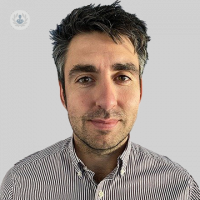What are the advantages and disadvantages of cardiac MRI scans?
Written in association with:Cardiac MRI (magnetic resonance imaging) is a non-invasive imaging technique used to assess the structure and function of the heart. It provides detailed images of the heart and surrounding blood vessels, helping to diagnose various cardiac conditions.
Like all medical procedures, cardiac MRI scans come with both advantages and disadvantages. Here to tell us all about is leading consultant cardiologist Dr Thomas Heseltine.

What are the advantages of cardiac MRI scans?
Detailed imaging
Cardiac MRI provides highly detailed images of the heart's anatomy, allowing for accurate evaluation of conditions such as heart failure, congenital heart disease, and myocardial scarring. It offers superior soft tissue contrast compared to other imaging methods like CT scans or echocardiograms.
Non-invasive and safe
Cardiac MRI is a non-invasive procedure that does not involve radiation exposure. Unlike X-rays or CT scans, MRI uses magnetic fields and radio waves, which are considered safer for patients, particularly those who may need repeated imaging.
Functional assessment
MRI can evaluate the function of the heart by measuring the blood flow, heart muscle performance, and detecting any scarring or damage. It provides precise information on the heart’s pumping ability and the health of the heart muscle.
Diagnosis of a wide range of conditions
A cardiac MRI can diagnose a variety of heart conditions, including cardiomyopathy, coronary artery disease, heart valve diseases and myocarditis. It is particularly useful in cases where other imaging methods may not provide sufficient information.
Detection of myocardial fibrosis and scarring
One of the key advantages of MRI is its ability to detect myocardial fibrosis (scarring of the heart muscle), which is critical in assessing the severity of certain heart diseases and planning treatment strategies.
What are the disadvantages of cardiac MRI scans?
Time-consuming
Cardiac MRI scans typically take longer than other imaging techniques such as echocardiograms or CT scans. A typical cardiac MRI can last between 30 minutes to an hour, which may be uncomfortable for some patients, particularly those with claustrophobia.
Limited availability
Not all medical centres have access to cardiac MRI scanners. This means that patients may need to travel to specialist centres for the scan, and waiting times for the procedure can be longer compared to other imaging techniques.
Expensive
Cardiac MRI is generally more expensive than other diagnostic tests like echocardiograms or stress tests. The high cost of the equipment and the procedure may limit its use, especially in routine diagnostic scenarios.
Contraindications
Certain patients cannot undergo MRI scans due to the magnetic field used. This includes people with metal implants, pacemakers, or other electronic devices that can be affected by the MRI's magnetic field. Patients with claustrophobia or those unable to remain still during the procedure may also find it challenging.
Not suitable for all heart conditions
While cardiac MRI is excellent for imaging the heart’s structure and function, it may not be the best diagnostic tool for all conditions. For example, coronary artery disease is often better assessed through coronary angiography or a CT scan of the coronary arteries.
Is a cardiac MRI scan right for me?
Cardiac MRI is a powerful tool for diagnosing and managing various heart conditions, offering detailed and safe imaging without radiation. However, its cost, availability, and patient limitations mean it is not suitable for everyone. A healthcare professional will decide if a cardiac MRI is the right diagnostic option based on the specific needs and circumstances of the patient.
If you think you might need a cardiac MRI, and you’re looking for expert cardiology treatment, arrange a consultation with Mr Heseltine via his Top Doctors profile.


